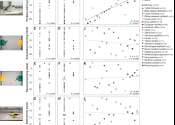Vocal learning in starlings linked to problem solving skills and brain size
The European starling boasts a remarkable repertoire. Versatile songbirds that learn warbles, whistles, calls, and songs throughout their lives, starlings rank among the most advanced avian vocal learners. Now a new study ...









